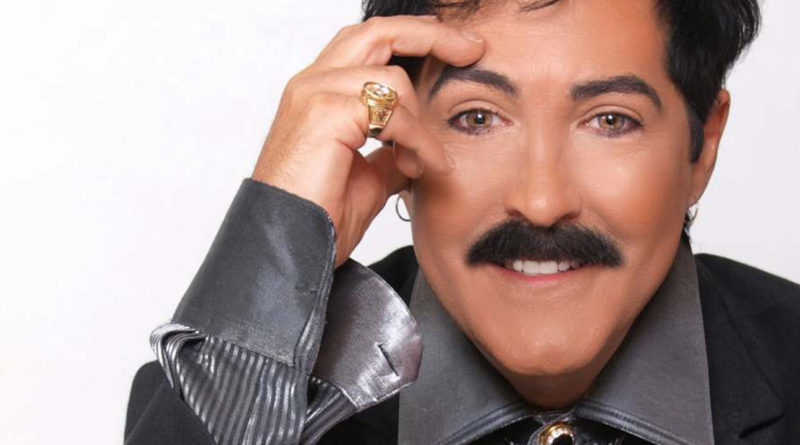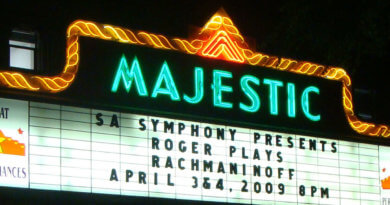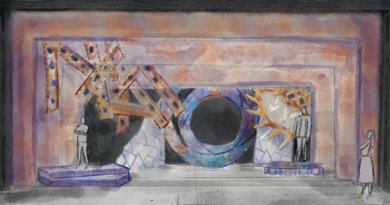Exclusive Interview: Actor, Writer and Producer Derek Berlin
Derek Berlin is a San Antonio actor, writer and producer who enjoys being a part of the lively theater scene here. His credits include two film pilots for HBO, commercials, print advertisements and numerous theatrical appearances around the country.
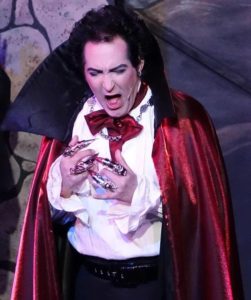
His most memorable roles are Ralf in Frozen and the vampire in Nosferatu, which won him the ATAC Globe Award for Lead Actor in a Musical. His one-man show, My Name Was Dorian…Dorian Gray, also received the ATAC Globe Award for Lead Actor in in a Drama. Other awards the show received were Adaptation of a Script, Original Score, and Overall Production of a Drama. His latest production, The Garden Poem, which he wrote, directed and starred in, recently finished its run at the Overtime.
Here, he talks with ArtScene SA about his storied career, how it all started and his impressions about the state of theater in the Alamo City.
BEGINNINGS
There was not a time in my life where I wanted to be something other than what I’m doing, which I’m sure is very abnormal, because kids want to be different things. Pilots, astronauts; that never was the way with me. The DNA in me — I somehow knew to fly south like a bird.
The first thing I remember is singing to Elvis Presley before I could speak. We had a French coffee table, and I climbed up on it. Since it was elevated, I must have thought of it as kind of a stage; like something I’d seen on TV. I remember being in a diaper, and I remember making sounds to Elvis, which is interesting, because people say when I sing, I have an essence of his tone in my voice. Not that I sing like Elvis, but that was my first impression, so I’m sure that I was influenced by that.
I never wanted to be anything else. I was with the Alamo Boys’ Choir, was was an international choir, They did rehearsals in this Methodist church. Well, my dad being a Methodist minister, I heard about the choir and wanted to join. We were at a social function and the man who was the director was there. I was a very shy child; never spoke unless I was pushing myself as a performer. Then I would go full-out marketing. I was reared with adults, so I talked like an adult even at age six. I was very precocious.
I walked up to him and said, “I hear you have a choir. I want to be a part of it.” He said, “How old are you?” I said, “I’m nine.” He replied, “Well, when you get to be 13 or 14, you can come audition for me.” I asked, “Why do I have to wait?” “Because you’ll have a better voice then,” he said. “But I can sing now!” I retorted, and I had no reservations about talking to an adult like that. He patted my head and said, “I’m sure you can.” Well, that just made me mad and I started belting something out. I had this really powerful voice as a child. “Where’s that coming from?” he asked. “My throat!” I said. “I told you I could sing!”
I sang at all the talent shows when I was in my early elementary years. All the kids liked me and I liked all the kids. It was a very happy little school; not like my later life when I ran into ugly people. Every time there was a birthday party, I got a gig. I would redo my little show. I was doing three or four shows a month for whomever was having a birthday. Parents would call and ask, “Can Derek come over and do a show?” I had a little racket going on!
GROWING UP
I was very unhappy growing up; I was a misfit. The only time I felt accepted was when I performed. I had a good home life — my parents didn’t beat me or anything, but I was just an odd kid, and very circumspect. Unfortunately, I wasn’t around kids enough to want to be a child. I was bullied growing up, tremendously. In fact, I’m going back to my high school reunion because these people who were mean to me now have to pay to see me. Some of these people actually came to my last show [The Garden Poem]. It was very rewarding to show them that maybe they had treated me badly, but other people like me.
It makes you think, “What have I done in my life that’s helped other people? Have I done a good enough job doing something that affected other lives?” That’s what this play did, hopefully, because it was about death and loss. Death is inevitable in our lives and how we deal with it. [My character] loses his wife, he loses his child, he loses his faith. He says some horrible things to God in one scene. But it’s a loving, forgiving God.
GIVING BACK
In all of my plays, I like to do something community service-wise. I’m not wealthy enough to be a big philanthropist, but I give all of my money to charity when I make it, whether it’s a stipend or if I’m paid for a show. With Dorian Gray, I gave my money to stonepillow.org, for clothing homeless people. When I did Frozen, which was a big turnaround in my career as far as my image (I played a child serial killer and pedophile), I raised several thousand dollars for child protection.
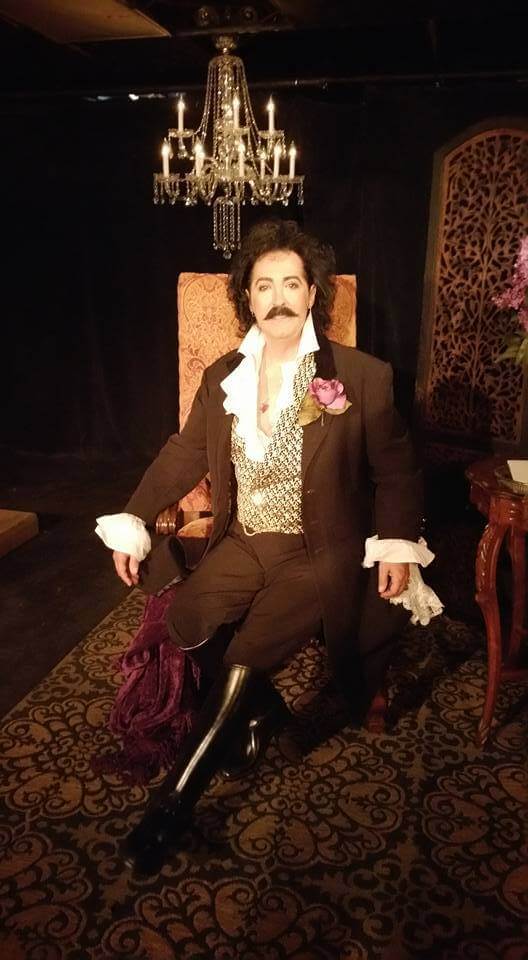
TALENT
Whatever talent you do have doesn’t come from you. It’s on loan. What gifts any of us have come from somewhere else. We’re just the carekeepers. I don’t understand these actors who go on these ego trips. You know, when you look at my headshots and they’re all polished and movie star-looking, I have to laugh at that. It’s an image you market and sell, and that’s it. It’s not who you are, and it doesn’t make you better than anyone else. It’s all a game. I don’t take anything seriously, except my work.
The photos from Dorian Gray are not touched up or Photoshopped. I spent a year having my face injected and having electricity shot through it three times a day. 87 chemical peels. I prepared for that role. I dropped 36 pounds. I knew what I had to do to pass off. When you don’t fit a role, you have to rely on your craft and convince people that you are that character.
STUDYING HIS CRAFT
I trained at Trinity University, and I was accepted by Uta Hagen in New York, but my family had some reservations with that, so I couldn’t go. But I did go to Los Angeles and I trained at Segue Studios there. I was at Trinity at the end of the Paul Baker period. We studied hardcore Method and Paul Baker’s theory.
We were trained so that you literally inhabited your character. I lived as Dorian Gray for a year; I lived as Johnny London for a year. I do everything I can to absorb into a character. I believe if you’re going to do something, you need to dive headfirst into it. That’s why I only produce one show a year and work on a character for that year.
I had a teacher tell me, in my senior year, “You’re one of the best actors we’ve ever had here, but you’ll have the hardest time making it because you don’t fit in. You’ll never be able to do the roles that are highly marketable because of your stature, because of your look and all of those elements. What you do choose, if someone casts you right, you’ll be exceptional.”
I didn’t have leading man good looks. I didn’t have the height or the body for that. I had to take second leads and turn them into leading performances. I had to work harder because I was smaller. My build was such a hindrance to me as an actor, I had to work three times as hard. That’s why I’m so hardcore Method, so craft-oriented.
PRODUCING
One of the reasons I went into producing is that I couldn’t find the right roles. I trained in Shakespearean acting, I trained in Greek acting, I trained in Medieval acting — all of these different styles and yet I wasn’t offered anything that would fit me. Finally, I said, “If I can’t go to the mountain, then I’ll make the mountain come to me.” So I found properties with characters that I can do.
THOUGHTS ON SAN ANTONIO THEATER
I love San Antonio. I’m very proud of our community. I don’t think we have community theater here anymore. I think we’ve gone above that. However, they keep rotating the same types of shows. Not to discount any of the shows that are happening right now; the musicals. They’re all wonderful musicals. They’re all extremely talented people, the directors and the performers. But it’s like watching Hope Floats on CMT. They play it all the time. How many times can we see Oklahoma? How many times can we see My Fair Lady? San Antonio needs to do something more unique.
The Garden Poem is about death. I’m trying to write and produce things that are different. We’ve gotten stuck in this endless musical revue and the same dramas. How many times can we do Anne Frank? We need to bring new things to the table. The Overtime Theatre is overlooked tremendously. They do not get the funding at all, which is terrible. It is the only place in town taking chances on unique projects. Dorian Gray won Best Production of the Year; it swept every single award with the exception of Best Director, but they wouldn’t show it anywhere else.
I’ve got characters lined up for the next ten years that I want to play, characters that will fit my body and will show my range as an actor.
It’s like you have to prove yourself over and over again. You’re only as good as your last play. I want to do something new; I want to do something unusual. I kept getting the same roles over and over again. I’m always cast as the nice guy next door. Well, I’d like to play an alcoholic, a drug addict or a serial killer. I’ve got characters lined up for the next ten years that I want to play, characters that will fit my body and will show my range as an actor.
We have left the era of community theater. There are actors in this city who are beyond exceptional. Your Aunt Ruby, who wanted to play Mame 25 years ago at the Playhouse, would have auditioned and probably gotten the role. Today, you’re auditioning with trained actors — even better than trained.
One of the best leading men we have in San Antonio is John Stillwaggon, And, for the record, he truly is the nicest actor I have ever met. I’m trying to find a property that we can both work on. He’s got the leading man looks, he’s got the height, and he has the talent. Unfortunately for me! But he’s a dear friend of mine.
San Antonio is the seventh largest city, yet we’re not paying our actors. And actors do need to be paid. When you’re paid for something, you do a better job. You show up on time. It gives you an accountability and I think we need that in this city. I appreciate the things [George] Green is doing with the Public Theater, trying to take it in a different direction. But everybody should be doing it at the same time to bring the level up. And instead of bringing people from the outside in, let’s promote the people here to the outside. Why can’t we make the people famous here?
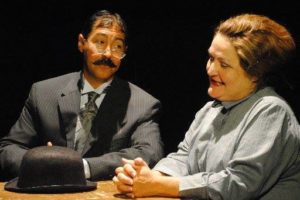
When I was starting out, you had three basic places to perform. Now you have all these independent production companies, like mine, Derek Berlin Productions, or Killer Productions. They’re leasing spaces and putting on some awesome shows.
The ideal place is somewhere like the Vex Theatre, where they have the income and budgets to do these beautiful sets. When I did When You Comin’ Back, Red Ryder? there, we had a working diner with a grill, and we cooked on the grill. I mean, everything worked.
ON THE HORIZON
I have a couple of projects in the works. My producer is named Brian Henderson, so we have B&B Productions. It’s a broad umbrella, so it does a lot of the theater music for my shows. He does all the music and I do all the writing. We have a two-year project we’re doing, hopefully, at Fort Sam. It’s a big Las Vegas revue. We have to record a full, themed CD, which we will build a complete show out of. This is also the third year I’ll be appearing with Alamo Vaudeville at the Tobin Center.
I hope that if I can bring anything to San Antonio, it’s something different — different as an actor, different as an theme, different as a production. I’m certainly not afraid of controversy.

